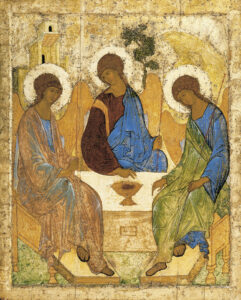Early on in ministry, one of my pastors sat me down to have a heart-to-heart about entering ministry. In this long conversation, my pastor imparted much of his own personal experiences into me. He shared about his ups and downs in ministry, his best learnings from years of experience, and his joy to continue to serve. Often this talk comes back to me during a ministry season, but one truth still rings the loudest from this. In one moment of the talk, he looked me square in the eyes and declared, “There are no lone rangers when it comes to ministry.” Essentially what my pastor was saying was that ministry was not meant to be done alone.
When we are engaged in the eternal battle of ministry, we can often face decisions, situations, and places that can be very taxing on our soul. The “dark night” of the soul can keep us awake at night as we reflect on the questions of “What if?” “Did I do the right thing?” or “Could I have said this better?” We all have that nasty message in our inbox, that person that only sees the things that we are doing wrong, and even those meetings that seem to suck the life out of our soul. It is for this reason that the words of my pastor ring so true for us all. No one should carry the weight of ministry on their own.
From the start of creation, even within the Godhead himself, we see that community is a central theme of God.
“From the start of creation, even within the Godhead himself, we see that community is a central theme of God.”

I love to study the Greek Icon depicting the “The Hospitability of Abraham.” Originally, it was meant to depict the conversation of the angels with Abraham in Genesis 18:1-6, but most Orthodox churches see it today as the Holy Trinity. In this, we see a visual representation of the community that was intended for all humanity, revealed to us through the relationship of the Trinity. In the painting, each person within the Trinity is leaning toward one another, with the communion cup layered within three points of the painting. The painting helps us see the deep longing for community and relationality that God has placed within us.
We know from Genesis 1:26 that God says, “Let us make mankind in our image.” Early within creation, God chooses to create man and woman, meant to be in community with each other. The theme continues repeatedly from the start to the end of Scripture that we are not meant to be alone. Even in the flood narrative, the animals are called into the ark in 2s and 7s. It is safe to make the conclusion that no one is meant to live life—or to do ministry—alone.
We also see what happens in isolation. As just one example, David’s sin with Bathsheba came in a moment when David was alone with his lustful thoughts. I recall a TV show that highlights the struggle of survival when you try to do it alone. Consistently over all the seasons I’ve viewed is one common theme: many of the contestants have the skills to physically survive alone, but the lack of human interaction still leads them to tap out of the competition. Too many pastors and ministers have tapped out of their calling and/or yielded to temptation because they have faced ministry alone.
“Too many pastors and ministers have tapped out of their calling and/or yielded to temptation because they have faced ministry alone.”
Also, we have often stifled the discipleship journey of many by placing a high emphasis on a person’s “personal devotion” to Christ. If we are not careful, we can even isolate ourselves in our faith journey.
Jesus knew the importance of togetherness when he sent out the seventy-two in Luke 10:1-12. As these disciples went out, they were paired up in twos. This was a strategic move on the behalf of Jesus. First, each disciple had an accountability partner built into the mission. They could share the ups and downs of each conversation with one another, each healing, and each exorcism. Each disciple was given a shared mission to prepare for the coming of the Lord. Ministry is likened to this simple concept; we are called to prepare the coming of Jesus into every person’s life. When we do this on our own, we can fall into vanity believing that we are the ones that are changing the lives of others. When we have a friend, a peer with us in the mission, that vanity can often subside with a quick reminding of what the shared mission is. Finally, you have another person who can verify the testimony. When God performs a miracle, you are both there to witness it and bring forth a verified account of God’s actions.
We find that every disciple returned full of joy, full of hope. Did every conversation go the way they wanted? No. And when things did go well, did the healing or miracle place one above the other? No. This was a shared experience, celebrated by all of them (Luke 10:17-22).
“This was a shared experience, celebrated by all of them.”
This is the way Jesus intends for us to pursue ministry. We all need a ministry buddy. We all need a peer, a friend to walk with us in this journey. We also need mentors. We need someone like my former pastor that shares wisdom and their own life experiences in such a way that prepares us for our future.
So, how do we ensure that we are not lone rangers in the mission field? Here are a couple ways.
First, pray for the right peer relationships and prioritize them. If you have a good peer relationship with someone, do not push that peer relationship away or let other things come before those important relationships. As we grow older, these relationships can become lost. Family and ministry commitments can get in the way of healthy peer relationships. With God first and your family next, ensure that those peer relationships are woven into the fabric of the relational rhythms of your life. This requires monthly reminders and intentional planning to safeguard that these relationships are playing their key role in your formation.
Second, make sure that you seek out mentors. Mentors can come in many forms and play various roles within your lifetime. These can be pastors, professors, business leaders, authors, or even just people who are a little further in their faith journey from you. These are people who help you with your next steps in life. Sometimes, we put these relationships in a traditional Greek philosopher-type setting where there is a teacher and pupil. However, it might be as simple as periodically getting together for coffee and asking advice. Practically speaking, we ought to have mentors for our careers, mentors for our families, and mentors for whatever ministry we are in.
“We ought to have mentors for our careers, mentors for our families, and mentors for whatever ministry we are in.”
The goal is to always be willing to listen to someone else that may be a little further down the road than you to gain wisdom from. This will help you to never be in a place where you are the lone ranger.











